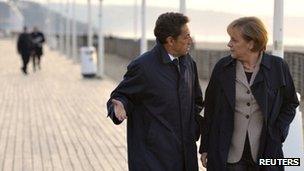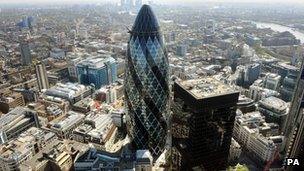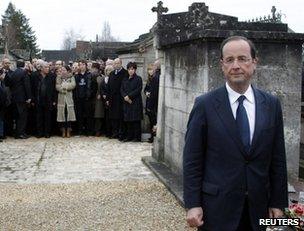Sarkozy Merkel talks: Busy agenda for EU's core couple
- Published
- comments

The French and German leaders together set the agenda for the eurozone
German Chancellor Angela Merkel and French President Nicolas Sarkozy hold their first meeting of the year in Berlin on Monday.
They are Europe's indispensable couple. They see each other at least every ten days. Next week they are in Rome, then Davos and then Brussels by the end of the month.
They are the eurozone's crisis managers. The other nations that use the single currency have become onlookers, summoned to summits to give their signatures to the latest Franco-German initiative. Never have smaller nations in the EU had less influence.
The relationship between Chancellor Merkel and President Sarkozy is much improved. They have chosen the face of unity in place of the finger-pointing and arguments and briefings against each other.
The regular meetings and smiles and embraces have led to a blending of the two captured by the name Merkozy.
In truth, fundamental differences remain.
Tax hurdle
The French still believe that the only answer to the crisis lies in the European Central Bank becoming the lender of last resort.
The Germans do not. They fear that this would encourage the reckless spending that caused the crisis.
The agreement between the two leaders is for the ECB to be allowed to get on with its job without them commenting on it.

There are fears in the UK that a financial transaction tax would hurt the City of London
That does not prevent President Sarkozy - as he did last week - still calling on "all European institutions" to play their part. A clear reference to the ECB.
Both leaders support a tax on financial transactions. They will discuss it again in Berlin.
The French president - almost perpetually impatient - is prepared to go it alone.
"We won't wait for others to agree to put it in place, we'll do it because we believe in it," he said last week.
The Germans are more cautious. They would prefer it to be on an EU basis. Only if that proved impossible would they settle for a tax operated by just the 17 eurozone countries.
The tax is a potential source of conflict with the UK. Britain will oppose it unless it is agreed on a global basis and supported by the G20.
Otherwise, it believes, the tax would just drive business away from the City of London.
French politics
France and Germany will also discuss the "fiscal compact" agreed at the summit in December.
This agreement aims to provide much greater discipline over budgets with sanctions against the rule-breakers.

Francois Hollande is challenging Mr Sarkozy for the presidency
The Germans had wanted an amendment to the EU treaties but UK Prime Minister David Cameron put an end to that by wielding his veto.
The hope is that the details of the compact will be ready to be discussed at a summit on 30 January, before finally being approved by the end of March.
Some details - like the role of the European institutions in enforcing the new rules - may yet prove divisive.
Over the next few months, President Sarkozy will, at every opportunity, play the activist leader. He faces an election in April and is behind in the polls.
His strongest card is to show that only he has the experience to tackle such a dangerous crisis. It cannot be left to his main challenger, Francois Hollande.
Hanging over the French leader, however, is the threat that France's credit rating may be downgraded as agencies cast doubt on French determination to manage its deficit.
The "fiscal compact" has little to do with addressing the crisis as it is today. Its impact will be in the long term.
It feeds into a wider criticism of Europe's leaders: that they never fail to focus on the wrong things, particularly institutional change.
Their one significant achievement is to convince outsiders of their determination to defend the single currency
Unfinished business
However the core of the eurozone crisis is revealed in all its stark details on almost a weekly basis - and many of these problems are slow in being addressed.
The imbalances between the strong and weak European economies are growing, increasing the strains of belonging to a single currency.
Joblessness is at an almost record high. Yet the numbers out of work in Germany compared to those in Spain just underlines that economies are moving apart.
Retail sales are down. Some countries - whilst imposing new austerity measures - are heading into recession. Consumer confidence is low.
Countries like Spain are struggling to reduce their deficits. Debt mountains remain stubbornly high. And the banks do not trust each other's accounts enough to lend to each other.
The Greek crisis is unresolved. The second bailout - still under discussion - may yet again prove inadequate. And investors still do not know what will happen to their money if a big economy like Spain or Italy gets into trouble.
Sooner or later these issues will have to be addressed.